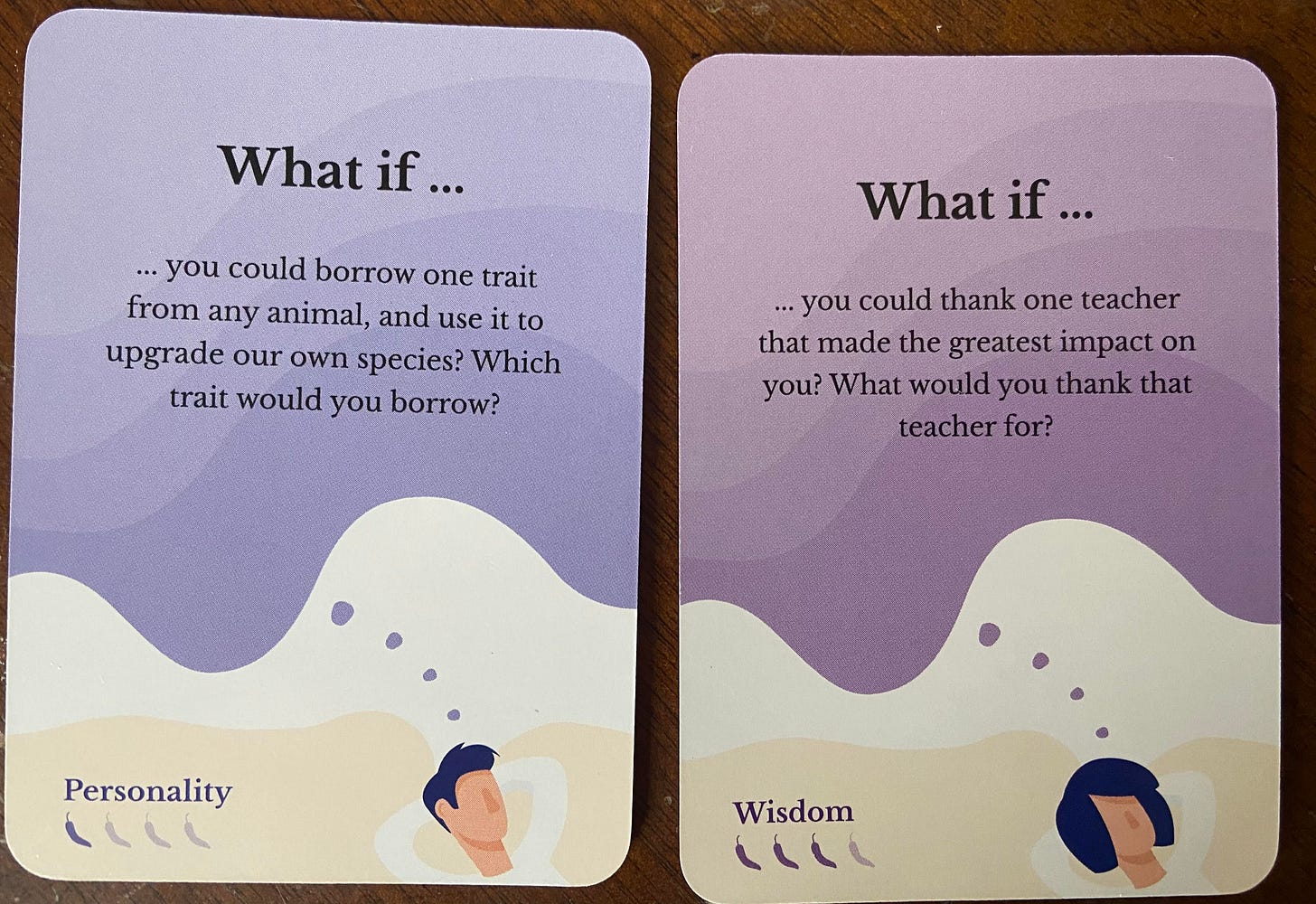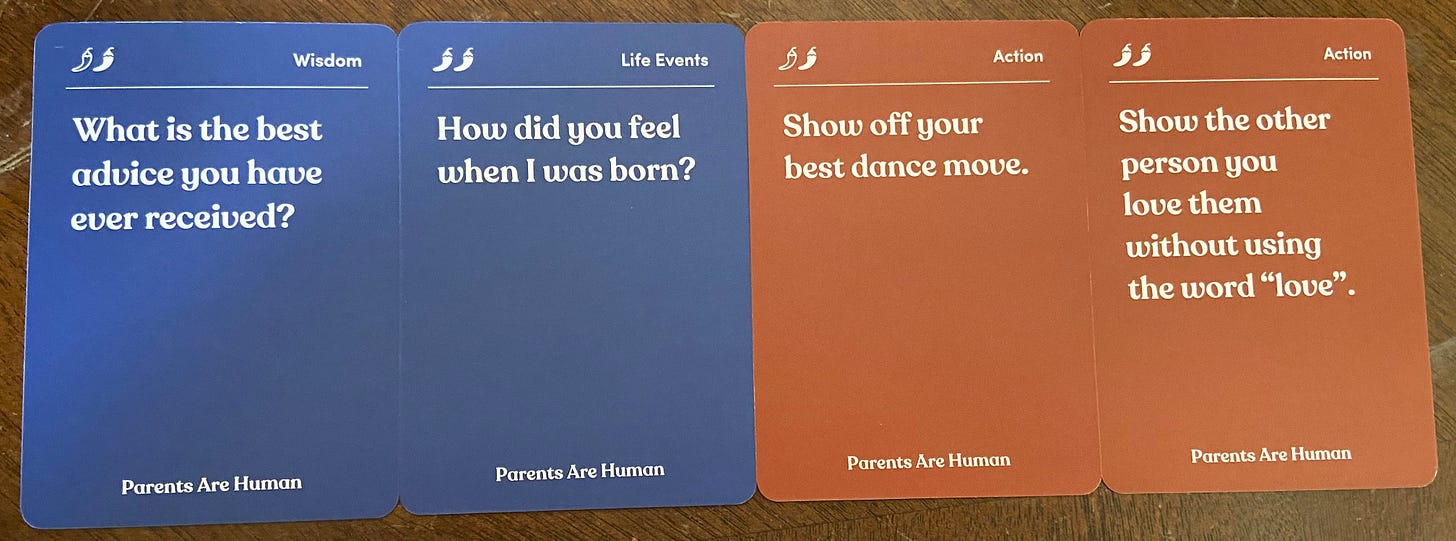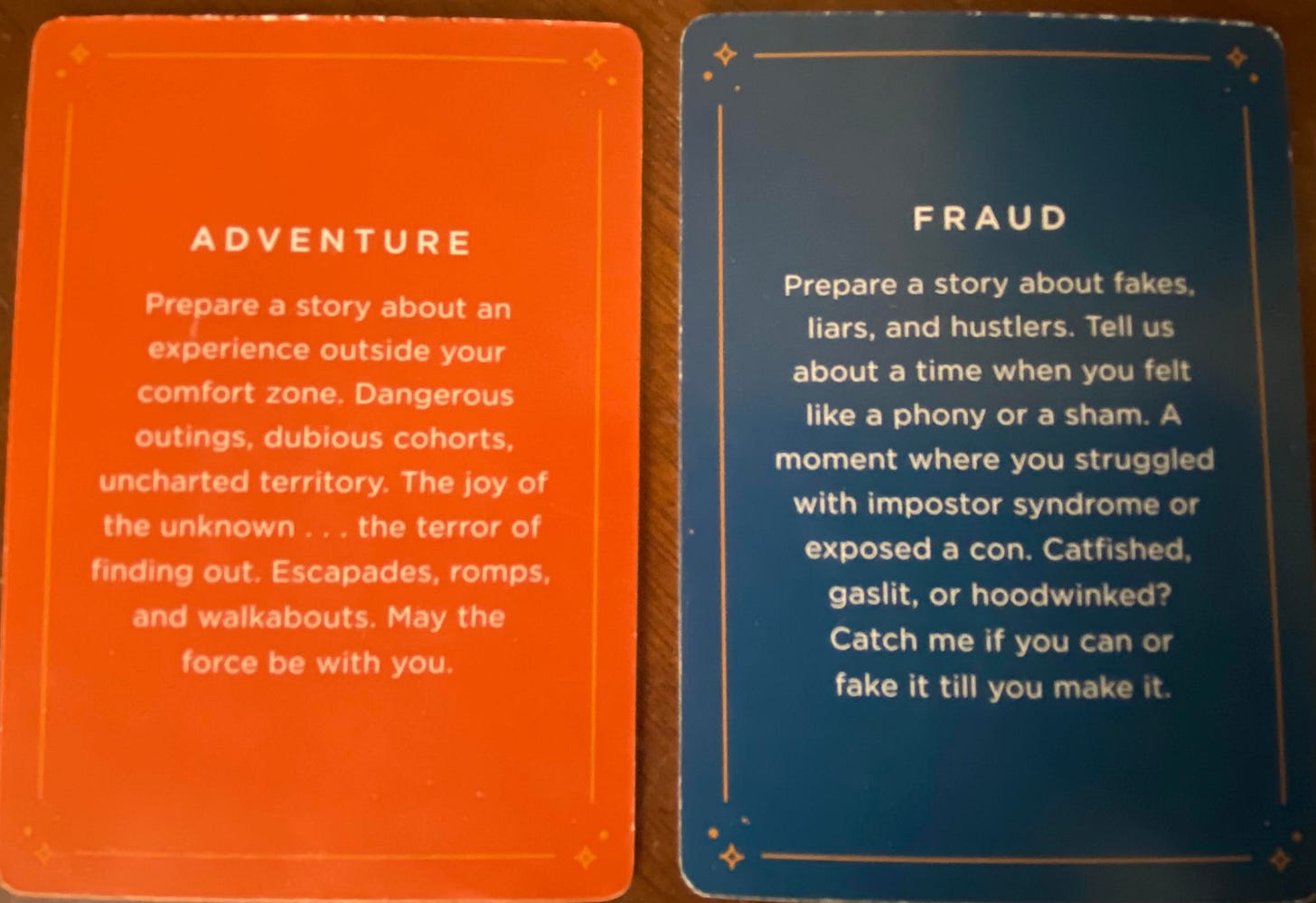Belonging Practice 2: Conversational Cards
Experiments using conversation cards with family and friends
Dear City Person,
In the 2nd post of each month, I share in this free weekly newsletter ways I have been trying to nurture my sense of belonging. Readers can join me in experimenting with these belonging practices and share their reflections with me via replying privately to this email or by commenting publicly on my Substack post.
If you haven’t already, check out my About page linked here for more information about my newsletter, Belonging Co-Lab and click here for an archive of previous posts. If you are reading this from the Substack app and have not already subscribed, you may do so by clicking on the button below.
Today I will be reflecting on my experience using conversational cards with family and friends. In case you are wondering, this post is not sponsored by any of the companies I will mention and I am not earning any affiliate fees from them.
I would encourage readers to create their own conversation cards; perhaps it can be a joint project with family and friends. But if you are struggling to start and cannot afford the cards I mention here or they do not ship to your country, then read on to see free samples of the ones I have so far tried. Few of the companies also have free samples on their social media pages and websites. Moving forward, I plan to have each of my newsletter posts feature a randomly drawn conversation card from any of the decks.
Here are examples of the decks I have used so far:
Friends Are Human (scroll down to find it)
Scenario Cards: Find a Purpose Box
Here are the ones I would like to try one day or try more often:
Ways of Looking at Art (while not a conversation card, it can be used to make viewing artwork with others more interactive)
Siblings are Human (scroll down to find it)
Grief is Human (scroll down to find it)
The Death Deck (check out their Instagram page which has free reflective/conversation prompts about death)
The End of Life (EOL) Deck (for caregivers and healthcare providers)
Bookakenia (this one is UAE-based, I especially want to try the ones for colleagues)
Before I share more on these, I have some questions for readers which you can reply to either privately via replying to this email or publicly on Substack comments below:
Have you ever tried using conversational cards or created your own conversational questions? If yes:
What decks or questions have you tried out?
How did they influence your conversations if at all?
What were your favorite questions (if any) and why?
If you have never tried them, would you want to? Why or why not?
If you want to try them:
What questions or cards do you want to start with?
Who would you want to try these out with?
Would you prefer creating your own questions or using cards with ready-made questions?
I was introduced to conversational cards through a Kickstarter campaign of Scenario Cards. I was partly skeptical as I wondered whether prompted conversation would make social interactions feel artificial. But I was mostly curious and decided to give them a try anyway with friends and a couple of times with family.
I learned about Parents Are Human through a sponsored Instagram post and was moved by the founder’s story of how he got the idea after struggling in his relationship with his immigrant parents. I especially liked that it has multilingual cards across a variety of Asian languages and got the bilingual English-Arabic one (they only have standard-written Arabic, so not dialect-specific). I also like that they are not just limited to questions to inspire conversation but also have action-based prompts that can range from silly (like: ”Play three rounds of tic-tac-toe”) to intimate (like: ”Apologize to each other for something that you did wrong in the past.”).
Parents Are Human later released other decks based on siblings, friendships, grief, and romantic partners. While I got those cards, I mainly tried the parents one and friendship one so far. I would like to try out the Arabic version of Parents Are Human with my grandmother and see how she responds.
Parents Are Human also has a free blog that you can sign up for here and they post interesting content on relational wellbeing on their Instagram page. One post I particularly liked pointed to an article in The Atlantic about the value of re-igniting child-like play and spontaneity in our adult friendships which you can find below:
Question for readers: do you have ideas for how to invite play and spontaneity in adult friendships?
Let me know if you would like to have your response featured in a future newsletter and if you would want to be mentioned by name or stay anonymous.
I ran into The Moth Story Cards while visiting an independent bookshop in Portland, Maine and used it with my brother during a 2-hour drive back to Boston and with a new friend I had made in Dubai. I used to listen to The Moth podcast since before podcasts became trendy and got to see one of their live story-telling shows in Boston pre-pandemic so I was thrilled to see their story cards. You can learn more about The Moth by clicking here.
While the prompts are longer than the other cards I have tried, I like that they can be interpreted in multiple ways and encourage story-telling versus just question-answer.
Far from making conversations artificial, I found that all the cards I have so far tried took the conversations to organic places neither side expected that would not have been as possible without the prompt, particularly with friends I don’t have as deep conversations with compared to my closer friends. In the case of my family, the cards showed me how easy it can be for us to take each other’s unconditional love for granted and assume that we don’t need to make as much of an effort to go deeper in our conversations especially when we get so lost in the daily grind. The cards also encouraged me to ask deeper questions about the stories of my paternal grandparents who both passed away in recent years.
One of my most enjoyable times using Scenario Cards was with my cousins and one of their spouses who was fairly new to our family during a family bbq in the desert. Since moving back to Dubai after a decade away, most of the times that I would see them were during formal family gatherings which limited spontaneity in our conversations. But the cards invited humor and depth and had us talk about different topics that diverged from the cards. I especially appreciated getting to know my cousin’s husband and seeing him exposed to our family’s fun side.
My favorite prompt from Friends Are Human is “What’s one thing you wish you understood better about me?” The same card is also in the Parents Are Human Deck. Both my parents and the friend I used this card with told me that they experience me as a very understanding person and a good listener so they do not feel that there is anything they wish that I would understand more about them. My dad believes that there is no benefit in being “understood” so he could not relate to the question whereas my mother believed that it is important for intimacy.
When it was my turn to share, I told my friend how oftentimes people assume I am calm when deep down I am not. I acknowledged my role in not having been as open about my inner struggles but at the same time there have been times when I have been more open only for others to not believe me because it is does not fit how they experience me. This had me value the friendships who were more attuned and who believed me when I shared I was struggling if they were not as attuned. This lead to my friend opening up about his struggles which I didn’t know about despite having known him as part of a friend group since university years.
Question for readers: What are your thoughts on the importance of being “understood?”
I wonder what it would be like to try these cards with strangers as a social experiment. I rarely if ever see people do social experiments in Dubai perhaps because people are worried about accidentally crossing legal or cultural lines but I may be mistaken.
If anyone Dubai-based has an idea about how I could go about this, please reach out to me through replying to this email or commenting below!
Here are my last questions for readers:
What are your thoughts on the cards I wrote about?
Has this post changed or not changed your thoughts about using prompts in conversations whether through conversation cards or your own self-created questions?
Next week’s newsletter will feature the work of Intentional Peer Support which you can learn more about by clicking here.










I love the idea of these conversational cards. I've added a few to my cart to check out!
I love the idea of these cards! I’m having a fantasy that my neurodiverse teenager will actually have a conversation with me by using these cards so I’m going to try it!